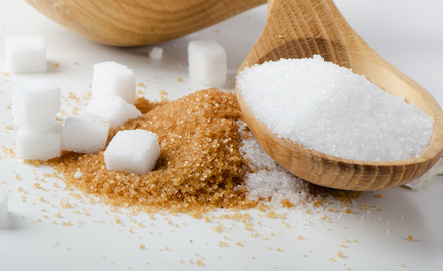If you know me personally you’ll know that I really push balance and moderation for myself, my husband, my kids and my clients. Yes, that includes enjoying sweets every now and then. 🙂
We all know that too much sugar can be quite harmful for the body and so limiting or decreasing our overall sugar intake is important. It’s now recommended that we consume no more than 6 tsp. of added sugar a day. This adds up to no more than 24g of sugar. Unfortunately, the average person is consuming 18 tsp of added sugar daily which is a total of 72g of sugar, and that’s a lot of sugar! (If you haven’t had a chance to read some of my previous posts just click here to read more on the negative effects of sugar.)
Want to cut back on added sugars? Reading labels is important and knowing that 4g of sugar is equal to 1 tsp will help you figure out how much added sugar you and your family are consuming.
Now don’t get me wrong I love a delicious cinnamon bun, homemade cookies, or some delicious chocolate, however, always in moderation.
There are several healthy sugar substitutes you can include in your diet, including:
- Stevia: Stevia is a natural sweetener derived from the leaves of the Stevia rebaudiana plant. It is calorie-free and has zero glycemic index, making it a great choice for people with diabetes or those watching their weight.
- Monk Fruit: Monk fruit sweetener is derived from the monk fruit, a small green fruit that grows in Southeast Asia. It is calorie-free and has a low glycemic index, making it a great sugar substitute for people with diabetes or those watching their weight.
- Erythritol: Erythritol is a sugar alcohol that occurs naturally in some fruits and fermented foods. It has 70% of the sweetness of sugar, but only contains 6% of the calories. It is also tooth-friendly and has a low glycemic index.
- Xylitol: Xylitol is another sugar alcohol that occurs naturally in some fruits and vegetables. It has 1/3 fewer calories than sugar and is tooth-friendly. However, it can cause digestive issues in some people if consumed in large amounts.
- Coconut sugar: Coconut sugar is made from the sap of the coconut palm tree. It contains trace amounts of vitamins and minerals and has a lower glycemic index than regular sugar.
- Sucanat: Sucanat is considered to be sugar in its most natural form and can replace white refined sugar in any recipe cup for cup, because it’s unrefined and contains molasses it’s also more nutritious.
- Honey: Honey, also being a natural sweetener unpasteurized honey specifically has a multitude of health benefits. Besides it giving you a natural energy boost, honey is antibacterial, anti-fungal and contains flavonoids which help reduce the risk of some cancers and heart disease. Honey is also great for cold and flu season as it’s antiviral which in turn helps fight colds and relieve sore throats.
Keep in mind, while sugar alcohols like erythritol and xylitol are often used as sugar substitutes due to their lower calorie content and tooth-friendly properties, they can cause digestive issues in some people.
When consumed in large quantities, sugar alcohols can be difficult for the body to absorb, leading to fermentation in the gut. This can cause bloating, gas, and diarrhea. Additionally, sugar alcohols can have a laxative effect and may increase bowel movements.
It’s important to note that not everyone will experience digestive issues when consuming sugar alcohols, and the severity of symptoms can vary depending on the individual and the amount consumed. Moderation is key when consuming sugar alcohols, and it’s a good idea to start with small amounts to see how your body reacts before incorporating them into your diet more regularly.
Furthermore, some people may be more sensitive to certain sugar alcohols than others. For example, xylitol can cause digestive discomfort at lower doses than erythritol in some people. If you experience significant digestive issues after consuming sugar alcohols, it may be best to avoid them altogether and look for other sugar substitutes that work better for you.
In conclusion, while these sugar substitutes are healthier options than regular sugar, they should still be consumed in moderation as part of a balanced diet.
Who should be watching their sugar consumption?
- People with diabetes: People with diabetes have high blood sugar levels and need to carefully manage their sugar intake to avoid spikes in blood sugar. Consuming too much sugar can also increase the risk of developing complications associated with diabetes.
- People who are overweight or obese: Consuming too much sugar can contribute to weight gain and increase the risk of developing obesity. Obesity is associated with a range of health problems, including diabetes, heart disease, and certain types of cancer.
- Children: Children tend to consume more sugar than adults, which can contribute to tooth decay and obesity. Encouraging children to consume less sugar can help establish healthy habits that can last into adulthood.
- People with high blood pressure: Consuming too much sugar can increase blood pressure, which can contribute to heart disease and stroke.
- People with a family history of heart disease: Consuming too much sugar can contribute to high blood pressure, high cholesterol, and other risk factors for heart disease.
- People with a history of liver disease: Consuming too much sugar can contribute to the development of non-alcoholic fatty liver disease, a condition where excess fat accumulates in the liver and can lead to liver damage.
Overall, it’s important for everyone to watch their sugar consumption and consume sugar in moderation as part of a balanced diet. However, for people in the groups listed above, monitoring sugar intake is especially important for maintaining good health.
In Health,

